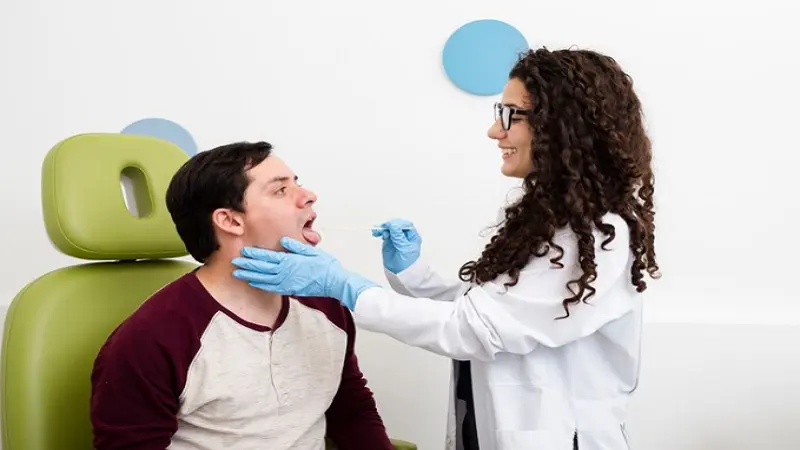A bright, healthy smile is crucial for overall health, yet many overlook the importance of good oral hygiene until issues arise. This guide offers essential tips for dental care enthusiasts, parents, and health-conscious individuals to maintain a vibrant smile at any age.
The Importance of Oral Health in Overall Well-being
Oral health is an integral indicator of your general health. The mouth is a gateway to the rest of your body, and problems here can lead to complications elsewhere. Good oral health reduces the risk of infections, heart disease, and even diabetes. By understanding its significance, you can take proactive steps to safeguard both your oral and overall health.
Researchers have found that inflammation caused by gum disease may increase your risk of heart disease. This connection highlights the importance of regular brushing and flossing, alongside professional cleanings. Paying attention to your oral health can prevent small issues from becoming major health concerns.
Daily Dental Hygiene A Guide for All Ages
Everyone, regardless of age, should maintain a consistent dental hygiene routine. Brushing twice daily with fluoride toothpaste is fundamental. This practice removes plaque—a sticky film of bacteria known to cause cavities and gum disease. Don’t neglect your tongue; it can harbor bacteria, leading to bad breath.
Flossing is equally crucial. It cleans areas your toothbrush can’t reach, such as between the teeth and under the gumline. For those new to flossing, start gently to avoid irritating your gums. With time, you’ll find it becomes a natural part of your routine.
For added protection, consider using mouthwash. It helps to rinse away remaining food particles and bacteria. Choose one that suits your needs, such as an antibacterial rinse to prevent plaque buildup or a fluoride rinse to strengthen enamel.
Nutritional Tips for Strong Teeth and Gums
What you eat directly affects your oral health. Calcium-rich foods like cheese, almonds, and leafy greens help strengthen tooth enamel. Vitamin D is also crucial as it aids in calcium absorption, so include foods like eggs and fish in your diet.
Limit sugary snacks and drinks. Bacteria in your mouth thrive on sugar, producing acid that wears away enamel. They not only provide essential nutrients but also stimulate saliva production, which naturally cleanses the mouth.
Hydration is key. Water helps wash away food particles and bacteria, reducing the risk of decay. Drinking fluoridated water can provide added protection against cavities, making it a smart choice for your family’s dental health.
The Role of Regular Dental Check-ups and Cleanings
Regular dental visits are crucial in maintaining oral health. Professional cleanings remove tartar—a hardened plaque that can’t be eliminated by brushing alone. Dentists, like those available in Colorado Springs, also check for signs of decay, gum disease, and other potential issues.
During your visit, don’t hesitate to ask your dentist questions. Discuss any changes or discomfort you’ve noticed in your mouth. Early detection of problems can lead to easier and more effective treatments.
Routine check-ups also provide an opportunity to receive personalized advice. Your dentist can recommend products or techniques tailored to your needs, ensuring you maintain the best possible care at home.
Special Considerations for Children and Seniors
Both children and seniors have unique oral health needs. For kids, establishing good habits early sets the foundation for a lifetime of healthy smiles. Encourage them to brush and floss with fun, colorful tools, making the process enjoyable rather than a chore.
Seniors face different challenges. Age-related changes like dry mouth can increase the risk of decay and gum disease. Regular dental check-ups are essential for monitoring these changes and adjusting care as needed.
Both age groups benefit from a diet rich in nutrients supporting oral health. Ensure children consume enough calcium and vitamin D for developing teeth, while seniors might need supplements or specific dietary changes to maintain strong gums and teeth.
Addressing Common Dental Issues and How to Prevent Them
Many dental problems are preventable with the right approach. Cavities are often due to poor oral hygiene and high sugar intake. Regular brushing, flossing, and dental visits can significantly reduce the risk.
Gum disease is another common issue. Early-stage symptoms include redness, swelling, and bleeding gums. Left untreated, it can progress to more severe conditions affecting the bone and supporting tissues. Maintaining a clean mouth and using antibacterial products can prevent gum disease.
Specialized toothpaste for sensitive teeth can provide relief, and your dentist may suggest treatments to address the underlying causes.
The Impact of Lifestyle Choices on Oral Health
Your daily habits influence your oral health more than you might think. Smoking and tobacco use are major risk factors for gum disease and oral cancer. Quitting these habits significantly improves your oral and overall health.
Stress can also impact oral health. It often leads to habits like teeth grinding, which wears down enamel and stresses the jaw. If you suspect you’re grinding your teeth at night, consult your dentist about possible solutions, like wearing a night guard.
Lastly, consider the impact of alcohol consumption. Excessive use can dry out your mouth, reducing saliva production that naturally protects against bacteria. Moderation is key to maintaining a healthy smile.
Conclusion
Now that you have a better understanding of the importance of daily dental hygiene, take steps to improve your oral health. Encourage your family and loved ones to do the same. Remember, prevention is always better than treatment when it comes to your teeth and gums. By making small changes in your habits and consistently practicing good oral hygiene, you can enjoy a lifetime of healthy smiles.
